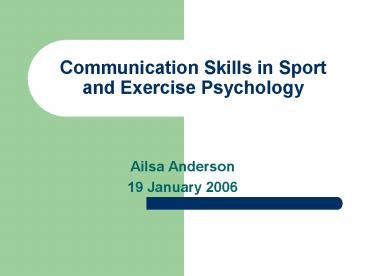Communication Skills in Sport and Exercise Psychology - PowerPoint PPT Presentation
1 / 12
Title:
Communication Skills in Sport and Exercise Psychology
Description:
Communication Skills in Sport and Exercise Psychology Ailsa Anderson 19 January 2006 Plan for today Define communication Describe characteristics of effective ... – PowerPoint PPT presentation
Number of Views:1109
Avg rating:3.0/5.0
Title: Communication Skills in Sport and Exercise Psychology
1
Communication Skills in Sport and Exercise
Psychology
- Ailsa Anderson
- 19 January 2006
2
Plan for today
- Define communication
- Describe characteristics of effective
communication - Highlight the importance of effective
communication in SP - Practice effective communication
3
Importance of effective communication
- Important in establishing rapport and trust with
athletes and coaches - Rapport and trust develops if individual feels
understood and accepted (Nelson-Jones, 1997) - Helps gather relevant information to support
athlete - Important skill for your needs assessment
4
Effective listening skills
- Very important skill in effective sport
psychologists. - E.G. -
- she (the SP) can listen to you, she wont
interrupt you, shell make sure youve finished
talking before she will get in there. Thats, I
think very valuable because you need that (GB
Athlete from Anderson et al., 2004) - Effective listening demonstrates we care enough
to hear the other persons view-point
5
Active listening
- Possess an attitude of respect and acceptance
- An Individual wont communicate with you if he
thinks you will judge him - Tune into the individuals viewpoint (empathy)
- Show that you (are trying to) understand their
viewpoint and what is going on for them - Yeah, your coach sounds awful
- You feel angry and frustrated with your coach?
- Nelson-Jones (1997)
6
Egans (1994) SOLER Guidelines
- S - Face the client squarely - a posture that
indicates involvement - O - Adopt an open posture
- L - At times it is possible to lean towards the
other - E - Maintain good eye contact
- R Try to be relatively relaxed
7
Asking questions
- Open vs closed questions
- So you feel nervous when it is a big
competition? - Tell me how you feel at big competitions?
8
Responding to the athlete
- Let the individual know you are hearing them
- Encourage the individual to continue
- Small rewards (NelsonJones, 1997)
- Then
- Sure
- Uh-uh
- And
- There you go!
- Head nods
- Eye-contact
9
Responding to the athlete
- Reflecting and paraphrasing
- Repeat back (using different words) what you
think you have understood from the client - Shows you are hearing (the content and emotions)
and being empathic - What I hear you say is that you are sad
because. - What caught my ear
10
Effective listening role plays
- In threes
- Discuss for 5 minutes
- How are you coping with final year?
- Your hopes and fears for post-graduation?
- Your ambitions in your sport
- Another topic
11
Effective listening role plays
- Bear in mind
- 1. Physical positioning
- 2. Open questions
- 3. Small rewards
- 4. Reflecting/ paraphrasing
12
Summary
- Defined communication
- Described characteristics of effective
communication - Highlighted the importance of effective
communication in SP - Practiced effective communication































